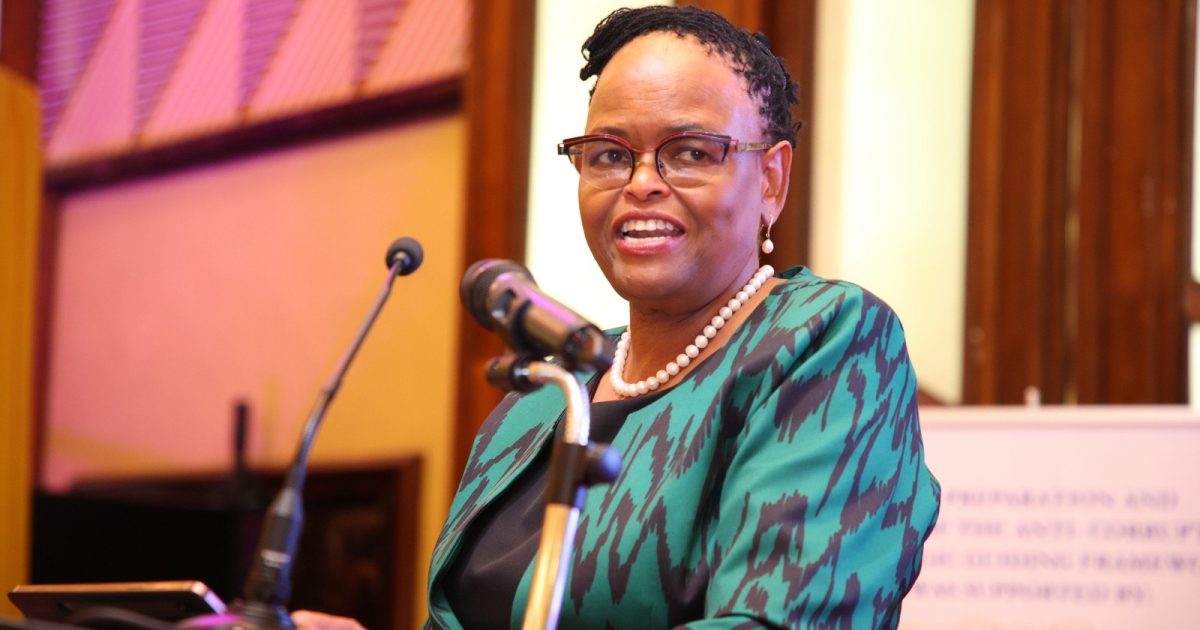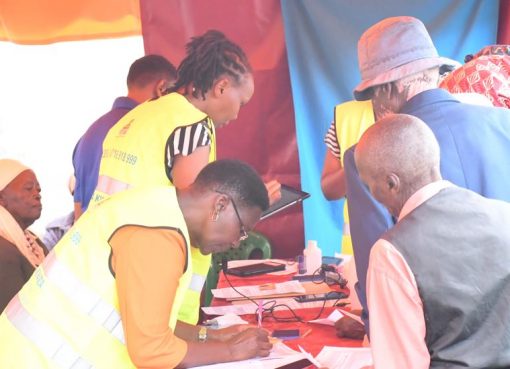Kenya has taken a major step in the fight against corruption with the launch of the Anti-Corruption Strategic Guiding Framework for the justice sector.
Speaking in Nairobi while launching the programme, Chief Justice (CJ) Martha Koome emphasized that the initiative marks the beginning of a bold new chapter in the collective commitment to integrity, accountability and justice.
The CJ stated that the framework developed under the National Council on the Administration of Justice (NCAJ), outlines short, mid and long-term strategies to eliminate corruption within the justice system.
Koome further disclosed that the framework was inspired by resolutions made at the Heads of the Arms of Government Summit convened by President William Ruto in January 2024 at State House, Nairobi.
“Corruption is a significant challenge that erodes public trust and weakens our institutions,” Koome stated, urging all stakeholders to actively implement the framework.
Additionally, she highlighted that inter-agency collaboration is key to tackling corruption and restoring confidence in the justice sector.
The CJ on the other hand reiterated that the Judiciary has already introduced Court Integrity Committees in every court to address corruption at the grassroots level.
“I have issued a directive for all courts to conduct daily morning briefings to affirm that no facilitation fee is required for justice,” she asserted.
In addition, Koome pointed out that the launch framework includes 76 programs aimed at reinforcing ethical leadership and ensuring effective legal reforms.
“Let this strategy be a living instrument that drives real change,” voiced Koome, noting that the success of this initiative will depend on political will, public participation, and proper resource allocation.
From her revelations, the CJ maintained that the framework is a roadmap for strengthening integrity and accountability in the justice system while assuring the Judiciary’s commitment by highlighting measures such as Court Integrity Committees and daily court briefings to ensure transparency.
To ensure the effective implementation of the framework, Koome urged all government agencies to deepen their commitment to constitutional mandates and work together in the fight against the corruption menace.
Further, she stressed on the need for adequate resource allocation from the National Treasury to support anti-corruption efforts, and called on Parliament to implement the legal reforms outlined in the framework, emphasizing that such reforms are critical in eliminating corruption.
“The success of this initiative depends on political will, collaboration, and public participation to create a justice system that upholds the rule of law,” restated Koome.
Echoing these sentiments was the Speaker of the National Assembly, Moses Wetang’ula, who acknowledged NCAJ’s role in driving reforms, in a speech delivered on his behalf by the National Assembly Deputy Speaker Gladys Sholei.
“The launch of this work is timely, coming barely a year after leaders of the three arms of government namely, the executive, legislature, and judiciary agreed to develop policies, guidelines, and legislative proposals to accelerate the fight against corruption,” observed Wetang’ula.
He highlighted Parliament’s unwavering commitment, noting that the Conflict-of-Interest Bill 2023 is awaiting final approval before being sent for presidential assent.
Wetang’ula further emphasized that Parliament is actively working on institutional reforms, including enhanced management of income and asset declarations, improved coordination with anti-corruption agencies, and stronger judicial collaboration.
He assured stakeholders of Parliament’s dedication to supporting justice sector institutions, stating that the framework is expected to improve justice sector efficiency, restore public trust, and foster Kenya’s socio-economic development.
The Speaker of the National Assembly reaffirmed the need for effective execution of anti-corruption measures, urging relevant agencies to embrace streamlined service delivery and inter-agency coordination.
In a quick rejoinder, the Cabinet Secretary (CS) for National Treasury and Economic Planning, John Mbadi highlighted the crucial role played by institutions such as the Ethics and Anti-Corruption Commission (EACC), Judiciary, Office of the Directorate of Public Prosecutions (ODPP), and National Police Service (NPS) in tackling corruption.
He stressed the importance of financial accountability, noting that the Financial Reporting Centre collaborates with multiple agencies to track illicit financial activities and recover stolen assets.
Mbadi also called for innovative financing methods to support anti-corruption efforts beyond reliance on the National Treasury.
Additionally, the CS assured stakeholders that the government remains committed to funding key institutions in the justice sector, despite the country’s tight fiscal space.
“The success of this framework depends on the goodwill, dedication, and commitment of all stakeholders, and this launch marks a new chapter in our nation’s journey towards a corruption-free Kenya,” he implored.
Mbadi encouraged all institutions involved to fully implement the framework’s strategies to ensure transparency and accountability because the framework is expected to enhance public trust, improve governance, and strengthen Kenya’s fight against corruption and economic crimes.
Concurrently, the Office of the Director of Public Prosecutions (ODPP) reaffirmed its commitment to expediting corruption and economic crimes cases through a new policy framework.
The ODPP boss Renson Igonga commended NCAJ for spearheading the initiative, emphasizing its role in enhancing efficiency in handling high-profile cases.
He noted that the new policy aims to streamline investigations, trials, and asset recovery to ensure faster justice delivery.
Igonga further highlighted the ODPP’s push for alternative dispute resolution methods, including plea bargaining, which has helped reduce case backlog while stressing the need for additional budgetary support to recruit specialized anti-corruption prosecutors and invest in technology-driven case management systems.
“The fight against corruption will be won through collaboration, technology, and strict adherence to timelines,” established the Director.
He reiterated that the ODPP remains committed to the Anti-Corruption Strategic Guiding Framework, calling on all justice sector stakeholders to fully implement its provisions to curb corruption and enhance accountability.
In her remarks, the Attorney General (AG), Dorcas Oduor outlined key strategies, including effective law implementation, capacity building, and bridging gaps between formal and informal legal systems to curb the corruption vice.
She also highlighted the judiciary’s push for digitalization to integrate its systems with key institutions.
“A strong legal framework is the backbone of justice, it must be clear, binding, and effectively enforced,” she stated, calling for collaboration in law and policy reforms.
Meanwhile, the Principal Secretary (PS) for Correctional Services, Dr. Salome Beacco reaffirmed the government’s commitment to fighting corruption through a multi-sectoral framework that enhances coordination in prevention, investigations, arrests, asset recovery, prosecution, and trials.
She emphasized the role of correctional services in rehabilitation and reducing recidivism.
“Corruption remains a major impediment to justice and economic growth, we are strengthening oversight, enforcing policies, and collaborating with agencies to ensure accountability,” she remarked.
Also speaking at the event was the Ethics and Anti-Corruption Commission (EACC) Chief Executive Officer (CEO), Abdi Mohammed who emphasized the need for a coordinated approach in tackling corruption, urging all stakeholders to take decisive action.
He added that over the last five years, EACC has prevented the loss of Sh41 billion, recovered Sh28 billion in corruptly acquired assets, and referred 762 cases for prosecution.
“Corruption threatens our stability and economic growth and only a whole-of-government and society approach can defeat it,” advised Mohammed.
He reiterated that the commission continues to conduct risk assessments and systems reviews across key institutions to enhance accountability.
By Clinton Ng’iela





